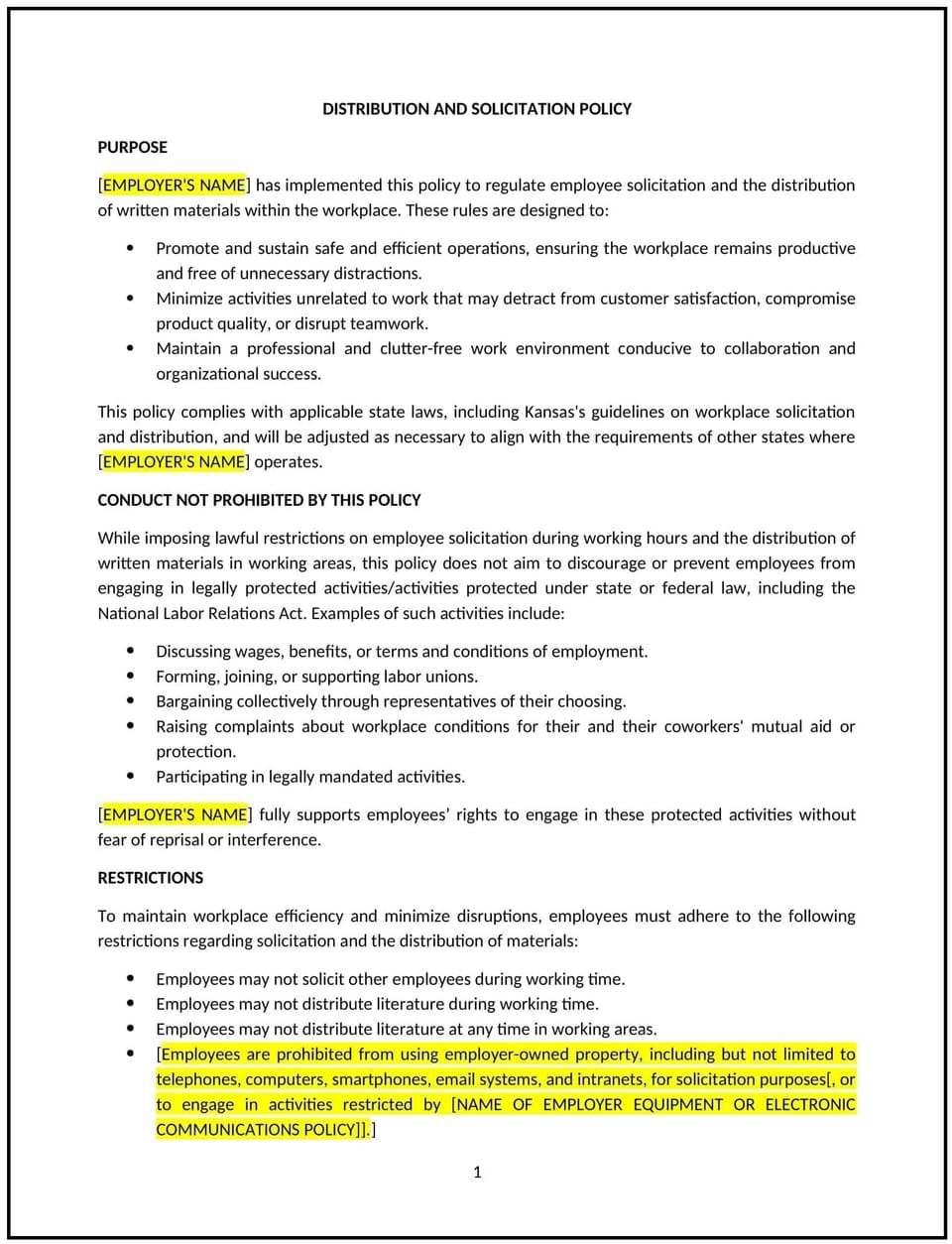Distribution and solicitation policy (Kansas): Free template

Distribution and solicitation policy (Kansas)
A distribution and solicitation policy helps Kansas businesses manage the distribution of promotional materials, solicitation activities, and interactions with the public within the workplace or business premises. This policy outlines acceptable practices, boundaries, and procedures for soliciting donations, advertisements, or other materials, ensuring that business operations are not disrupted.
By implementing this policy, businesses can maintain a professional environment, protect employees from unwelcome solicitation, and ensure that promotional efforts align with business goals.
How to use this distribution and solicitation policy (Kansas)
- Define acceptable solicitation activities: Businesses should specify what types of solicitation are allowed on business premises, including charitable donations, advertising, or sales pitches.
- Set boundaries for solicitation: Businesses should identify designated areas, times, or conditions under which solicitation may occur, such as allowing only in common areas or during non-working hours.
- Establish approval procedures: Businesses should require that any solicitation or distribution of materials be approved by management in advance.
- Prohibit disruptive solicitation: Businesses should ensure that solicitation activities do not interfere with employees’ work duties, customer interactions, or business operations.
- Address third-party solicitation: Businesses should clarify whether outside organizations or vendors are allowed to solicit on company property and under what conditions.
- Ensure employee rights: Businesses should allow employees to engage in personal solicitation outside of business hours and in a manner that does not disrupt the workplace.
- Review and update regularly: Businesses should periodically evaluate the policy to ensure it aligns with operational needs and maintains a productive workplace environment.
Benefits of using a distribution and solicitation policy (Kansas)
- Maintains workplace professionalism: Reduces interruptions and distractions caused by unsolicited materials or requests.
- Protects employee time and focus: Ensures that employees are not overwhelmed by non-work-related solicitation during working hours.
- Enhances operational efficiency: Prevents disruptions in business operations that may arise from unregulated solicitation or distribution activities.
- Clarifies expectations: Provides clear guidelines for employees and third parties, reducing confusion about what types of solicitation are allowed.
- Promotes fairness: Ensures that all employees have an equal opportunity to participate in authorized solicitation activities.
- Protects company reputation: Safeguards the business from associations with unsolicited or irrelevant promotional activities.
Tips for using this distribution and solicitation policy (Kansas)
- Communicate the policy clearly: Businesses should inform employees about the boundaries for solicitation and the process for seeking approval for activities.
- Set clear approval guidelines: Businesses should provide a straightforward process for employees and external parties to request permission for solicitation or distribution activities.
- Monitor compliance: Businesses should ensure that all solicitation activities are in line with company policy and intervene when necessary to prevent disruptions.
- Encourage fair participation: If employee solicitation is permitted, businesses should allow equitable opportunities for all employees to participate, as long as it doesn’t affect workplace productivity.
- Ensure consistency in enforcement: Businesses should apply the policy fairly across all employees and third parties to avoid preferential treatment or inconsistency.
Q: Why should Kansas businesses implement a distribution and solicitation policy?
A: Businesses should implement this policy to prevent workplace disruptions, clarify solicitation boundaries, and maintain a professional and efficient work environment.
Q: What types of solicitation should businesses allow on their premises?
A: Businesses should allow solicitation related to company-approved causes, charity events, or promotional activities that align with company goals, as long as it does not interfere with work duties.
Q: How should businesses handle solicitation requests from third parties?
A: Businesses should require third parties to submit written requests for approval before soliciting on company property and evaluate these requests based on relevance and potential impact on business operations.
Q: Can employees solicit or distribute materials during working hours?
A: Businesses should clarify whether personal solicitation is allowed during non-working hours or breaks, and whether distribution of materials can happen in common areas without interfering with work.
Q: How should businesses handle disruptive solicitation activities?
A: Businesses should intervene promptly to stop any solicitation that disrupts employee work or customer interactions and remind employees or third parties of the policy’s boundaries.
Q: How often should businesses review and update their distribution and solicitation policy?
A: Businesses should review the policy annually or whenever operational needs or workplace conditions change to ensure it remains effective and relevant.
This article contains general legal information and does not contain legal advice. Cobrief is not a law firm or a substitute for an attorney or law firm. The law is complex and changes often. For legal advice, please ask a lawyer.


